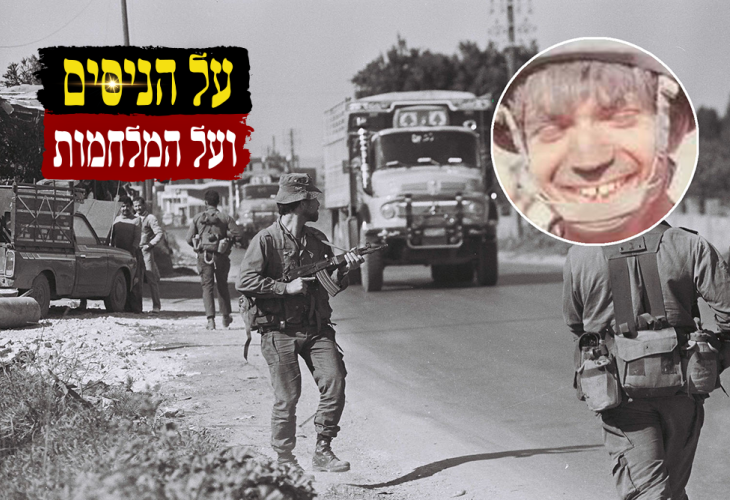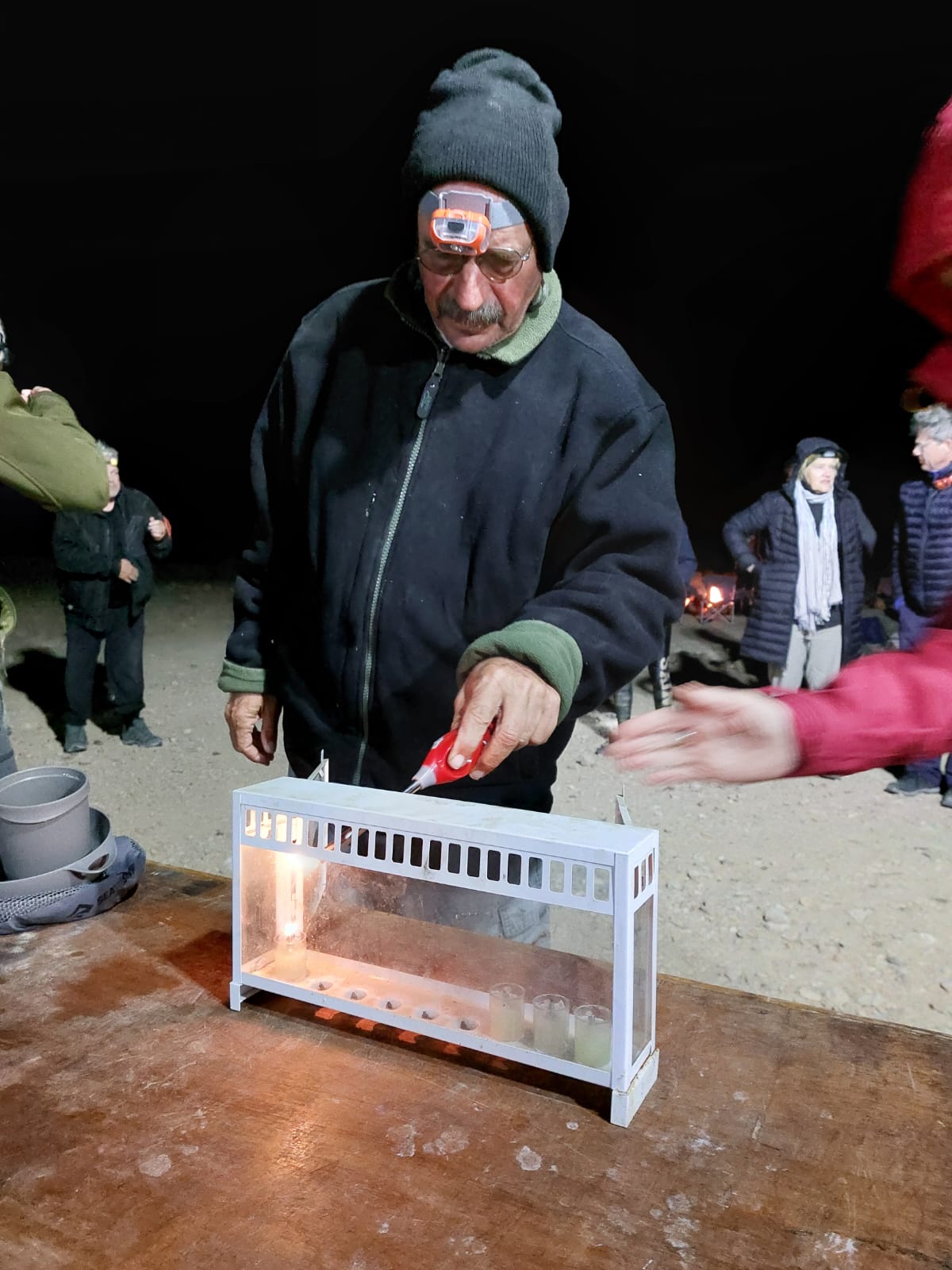"I asked the commander, 'How can I enter enemy territory with a cast?' and he replied, 'No choice'"
Binyamin Blum was injured in the First Lebanon War while rescuing wounded soldiers from a minefield. Despite his severe injury, he insisted on returning to fight. Then, with his leg in a cast and in pain, the commander informed him: 'We're entering Beirut, and you're coming with us.'
 In the circle: Binyamin Blum during his military service (Illustrious photo: Yossi Zamir / Flash 90)
In the circle: Binyamin Blum during his military service (Illustrious photo: Yossi Zamir / Flash 90)When you meet tour guide Binyamin Blum leaping between paths in the Negev or alternately guiding groups in the north, without resting and without stopping, you'll find it hard to believe this man was severely injured in the First Lebanon War.
It's not only his energy and physical fitness, but also his zest for life and ever-present smile. It seems he lives life to the fullest, enjoys it, and knows how to make the most of it.
"I love what I do," he simply explains, "The tour guides are part of me and my life. I feel we just need to take advantage of the opportunity we have to travel in such a wonderful and special country, primarily I try to guide as many hikes related to nature and the Bible, and there are so many of these places in Israel."
Injury in a Minefield
Even as a young man, Binyamin loved to hike. He also planned several major trips, but then the First Lebanon War arrived and froze his plans for a while.
"I entered Lebanon with my unit alongside the entire army on the first day of the war," he recalls. "Our battalion's task was to conquer one of the terrorist posts that covered a very strategic position. It was clear that once we conquered the target, there would be significant progress. However, the target was considered fortified, so we understood it wouldn't be easy to take it."
The words "not easy" quickly turned bloody. It turned out that during the battalion's operations, they got entangled, and soldiers reached a minefield and were injured. Other soldiers tried to rescue them, and then they too were wounded, creating a kind of chain reaction. "At that time, my role was to be the communications operator for the deputy battalion commander, and since the battle we participated in was over and I had nothing left to do in the field, I asked the deputy commander for permission to help evacuate the wounded from the minefield."
Weren't you afraid?
"Not at all. In such moments, there's no fear, and the thought 'What if I accidentally step on a mine?' doesn't cross your mind. These are times when everything moves quickly, and you act according to the training and knowledge you have."
Binyamin pauses for a moment and requests to explain the minefield evacuation procedure: "In a minefield, the danger is obviously great, so when going to rescue, you must equip yourself with 'saboteur sandals'—these are sandals built on spongy surfaces that reduce the pressure on the mine. Each sandal is a mountain 40 cm high and also weighs quite a bit, but it's the only option. For the wounded—the instruction is to place 'explosion cushions' under their feet; for every step you take, you must place a cushion to prevent a mine explosion. Each evacuation requires two cushions and very slow progression—step by step, so everything takes a very long time. Of course, I didn't operate alone; I had other officers with me who assisted in the evacuation, a doctor who provided field treatment, and many other brave people working with us."
 Binyamin Blum, lighting Chanukah candles, this week with tourists
Binyamin Blum, lighting Chanukah candles, this week with tourists"After we managed to rescue the first two wounded, we prepared to evacuate the most critically injured soldier, who because of the severity of his injuries couldn't walk. The doctor who treated him made it clear he was ready for evacuation, and we planned to carry him by stretcher, which required four soldiers, all equipped with saboteur sandals, as well as four explosion cushions to place under each leg of the stretcher. We set out on the evacuation journey as fast as possible, given the difficult conditions, understanding that every second was precious since in the meantime, the wounded soldier could lose a lot of blood."
"We managed to progress a significant distance, and since it wasn't our first time making this route, we knew how to be cautious, constantly reminding each other: 'there's a mine here,' and 'watch out for that mine.' However, because it was nighttime, we had to strain hard not to step on them by mistake. Apparently, our caution wasn't enough, because at some point I stepped on a mine, and immediately there was a tremendous explosion and we all flew in the air, along with the stretcher."
Binyamin doesn't remember the moments following because he lost consciousness. "People who saw us later told me that we all flew a meter and a half high along with the stretcher. Sadly, in that explosion, the soldier we were rescuing was also killed, and we were all injured."
The next thing Binyamin remembers is lying on the ground amid cries and calls, "and of course the smell," he adds, "the smell of gunpowder that took me a long time to forget. They tried to treat me in the field for a long time, and finally, we were evacuated by tank to Ziv Hospital in Safed."
Back to the Battlefield
Binyamin knows quite a few injured people who describe how their lives changed all at once after being injured, but in his case, he claims things were different. "Quite the opposite," he says, "Although I went through a long hospitalization at Ziv, then I was transferred to Hadassah Hospital and from there to other places for rehabilitation, throughout that time, I knew the war was still ongoing, and I wanted more than anything to return to Lebanon and help my friends fight. I felt it couldn't be that everyone else was continuing the battle, and I was lying in the hospital."
Were you physically capable of returning to the field?
"Now I understand definitely not, but at the time I didn't think too much about it; I just wanted to go back. It was important to me, and I fought with all the tools I had. Battling military bureaucracy is known as one of the complex tasks in our country, but I didn't give up. After applying pressure for about three months, I finally received the message: 'You can return to the battalion.' There was no one happier than me. I took all my gear that day and traveled to the battalion, which was stationed in a villa district near Beirut. It was clear to me I wouldn't be fighting directly, as I was still with a cast on my leg, and not just any cast, but one everyone already drew on and wrote me best wishes for a full recovery. There was pain, and I could barely move, but the commanders made it clear beforehand; they were listing me as 'operations room sergeant' and not a fighter, so I understood I would just be responsible for radios and relaying orders to the battalion."
"Thus I arrived at my company, found everyone seated in a circle receiving a briefing for entry from the west of Beirut. When they saw me, they invited me to join, and suddenly I discovered the list of names and was amazed to find I was not an operations room sergeant, but commander of an APC convoy. I suddenly realized—after the soldiers entered on foot, an APC convoy was needed to assist them in exiting, and I was nothing less than the convoy commander. I felt uneasy and approached the commander: 'I'm in a cast; I can't go in,' and then he said to me: 'Binyamin, I'm sorry, but if you're not there, I have no one else to put in your place. Anyway, as an APC convoy commander, you don't need to walk or run, just sit.' The truth is I could feel a sort of triumph—seeing myself return within three months from a severe injury to enemy territory and even become an APC commander. But I understood very well the level of risk due to being injured. Despite that, I remember taking a deep breath and telling the commander: 'Okay, I take this on myself.' Ultimately, the mission was canceled, and thank Hashem, as you can see, I'm alive and well."
Striving to Be a Hero
Binyamin concludes his story with a big smile—the same smile we've discovered accompanies him regularly, and now it turns out it's a smile of gratitude and understanding of life's meaning. "I try to see everything from the bright side," he concludes, "Even with the injury I experienced, I preferred to see the good and the rehabilitation, not the tragedy. But if I take what's happened to me seriously, I can say that minefield rescues sound like a big deal. It's not for nothing that I later received a medal of valor. But there were other people with me, and we all acted together as instructed. Anyone could do it, and I was just a soldier."
"The real heroism is not in the action itself but in your ability to make a decision at the right time, even if inside, you feel it’s better to act differently, as it is written in Pirkei Avot, 'Who is mighty? He who subdues his inclination.' In the minefield rescue, I didn't face a dilemma; it was clear to me I was jumping in, but when I was asked to command an APC, I could have said that's not what I was sent for and I'm not capable. Despite this, I understood for the sake of the war, I had to take on the role, enter enemy territory while in a cast and wounded, and it was for making this decision that I felt I truly needed courage."
"I think it's a message relevant to each of us in any life situation. You never know where and when it will catch you, and you'll be required to show your valor—it could be when you're behind the wheel, or when someone collapses on the street and needs help, or in any other situation. In such moments, you need to be able to make the right decision at a moment's notice. If you remember my story at that time—I've done my part."

